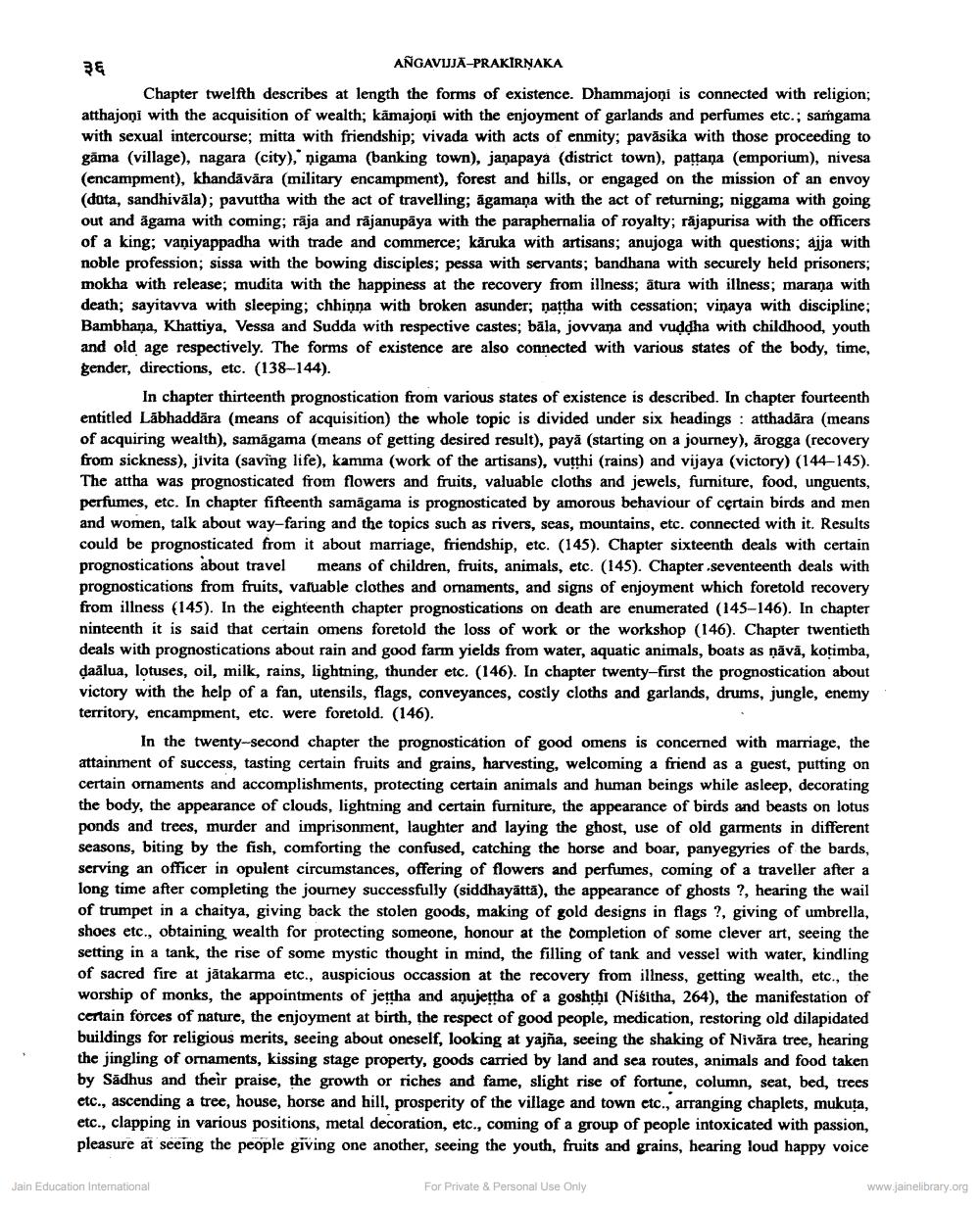________________
३६
AÑGAVIJJĀ-PRAKIRŅAKA Chapter twelfth describes at length the forms of existence. Dhammajoni is connected with religion; atthajoni with the acquisition of wealth; kamajoni with the enjoyment of garlands and perfumes etc.; sargama with sexual intercourse; mitta with friendship; vivada with acts of enmity; pavāsika with those proceeding to gāma (village), nagara (city), nigama (banking town), janapaya (district town), pattaņa (emporium), nivesa (encampment), khandāvāra (military encampment), forest and hills, or engaged on the mission of an envoy (duta, sandhivāla); pavuttha with the act of travelling; agamaņa with the act of returning; niggama with going out and agama with coming; rāja and rājanupāya with the paraphernalia of royalty; rajapurisa with the officers of a king; vaniyappadha with trade and commerce; käruka with artisans, anujoga with questions; ajja with noble profession; sissa with the bowing disciples; pessa with servants; bandhana with securely held prisoners; mokha with release; mudita with the happiness at the recovery from illness; atura with illness; marana with death; sayitavva with sleeping; chhinna with broken asunder; nattha with cessation; vinaya with discipline; Bambhana, Khattiya, Vessa and Sudda with respective castes; bāla, jovvana and vuddha with childhood, youth and old age respectively. The forms of existence are also connected with various states of the body, time, gender, directions, etc. (138-144).
In chapter thirteenth prognostication from various states of existence is described. In chapter fourteenth entitled Lābhaddära (means of acquisition) the whole topic is divided under six headings : atthadāra (means of acquiring wealth), samāgama (means of getting desired result), payă (starting on a journey), arogga (recovery from sickness), jivita (saving life), kamma (work of the artisans), vutthi (rains) and vijaya (victory) (144-145). The attha was prognosticated from flowers and fruits, valuable cloths and jewels, furniture, food, unguents, perfumes, etc. In chapter fifteenth samāgama is prognosticated by amorous behaviour of certain birds and men and women, talk about way-faring and the topics such as rivers, seas, mountains, etc. connected with it. Results could be prognosticated from it about marriage, friendship, etc. (145). Chapter sixteenth deals with certain prognostications about travel means of children, fruits, animals, etc. (145). Chapter .seventeenth deals with prognostications from fruits, vafuable clothes and ornaments, and signs of enjoyment which foretold recovery from illness (145). In the eighteenth chapter prognostications on death are enumerated (145-146). In chapter ninteenth it is said that certain omens foretold the loss of work or the workshop (146). Chapter twentieth deals with prognostications about rain and good farm yields from water, aquatic animals, boats as ņāvā, kotimba, daālua, lotuses, oil, milk, rains, lightning, thunder etc. (146). In chapter twenty-first the prognostication about victory with the help of a fan, utensils, flags, conveyances, cosily cloths and garlands, drums, jungle, enemy territory, encampment, etc. were foretold. (146).
In the twenty-second chapter the prognostication of good omens is concerned with marriage, the attainment of success, tasting certain fruits and grains, harvesting, welcoming a friend as a guest, putting on certain ornaments and accomplishments, protecting certain animals and human beings while asleep, decorating the body, the appearance of clouds, lightning and certain furniture, the appearance of birds and beasts on lotus ponds and trees, murder and imprisonment, laughter and laying the ghost, use of old garments in different seasons, biting by the fish, comforting the confused, catching the horse and boar, panyegyries of the bards, serving an officer in opulent circumstances, offering of flowers and perfumes, coming of a traveller after a long time after completing the journey successfully (siddhayattā), the appearance of ghosts?, hearing the wail of trumpet in a chaitya, giving back the stolen goods, making of gold designs in flags ?, giving of umbrella, shoes etc., obtaining wealth for protecting someone, honour at the Completion of some clever art, seeing the setting in a tank, the rise of some mystic thought in mind, the filling of tank and vessel with water, kindling of sacred fire at jätakarma etc., auspicious occassion at the recovery from illness, getting wealth, etc., the worship of monks, the appointments of jettha and anujettha of a goshthi (Niśitha, 264), the manifestation of certain forces of nature, the enjoyment at birth, the respect of good people, medication, restoring old dilapidated buildings for religious merits, seeing about oneself, looking at yajña, seeing the shaking of Nivāra tree, hearing the jingling of ornaments, kissing stage property, goods carried by land and sea routes, animals and food taken by Sadhus and their praise, the growth or riches and fame, slight rise of fortune, column, seat, bed, trees etc., ascending a tree, house, horse and hill, prosperity of the village and town etc., arranging chaplets, mukuta, etc., clapping in various positions, metal decoration, etc., coming of a group of people intoxicated with passion, pleasure at seeing the people giving one another, seeing the youth, fruits and grains, hearing loud happy voice
Jain Education International
For Private & Personal Use Only
www.jainelibrary.org




